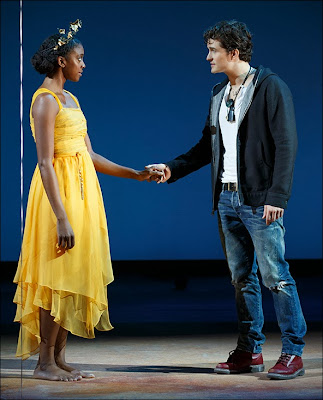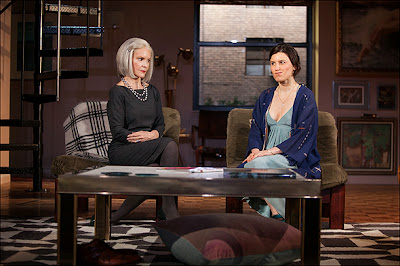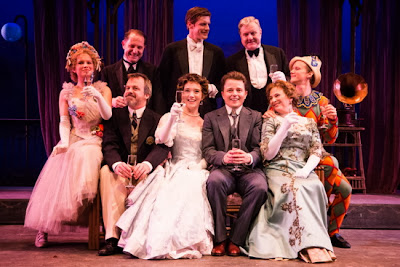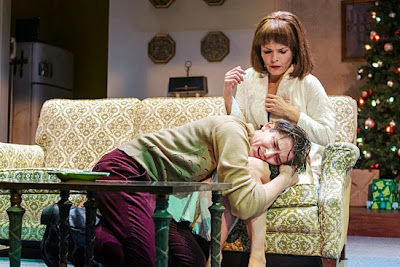the traveler's resource guide to festivals & films
a FestivalTravelNetwork.com site
part of Insider Media llc.
You are here: Home  Film & Arts
Film & Arts  Reviews
Reviews  NYC Theater Roundup: “Romeo and Juliet,” “Women or Nothing,” “You Never Can Tell,” “Natural Affection”
NYC Theater Roundup: “Romeo and Juliet,” “Women or Nothing,” “You Never Can Tell,” “Natural Affection”
 Film & Arts
Film & Arts  Reviews
Reviews  NYC Theater Roundup: “Romeo and Juliet,” “Women or Nothing,” “You Never Can Tell,” “Natural Affection”
NYC Theater Roundup: “Romeo and Juliet,” “Women or Nothing,” “You Never Can Tell,” “Natural Affection”NYC Theater Roundup: “Romeo and Juliet,” “Women or Nothing,” “You Never Can Tell,” “Natural Affection”
- Details
- Parent Category: Film and the Arts
- Category: Reviews
- Published on Monday, 30 September 2013 21:27
- Written by Kevin Filipski
Romeo and Juliet
Written by William Shakespeare; directed by David Leveaux
Women or Nothing
Written by Ethan Coen; directed by David Cromer
You Never Can Tell
Written by Bernard Shaw; directed by David Staller
Natural Affection
Written by William Inge; directed by Jenn Thompson
 |
| Rashad and Bloom in Romeo and Juliet (photo: Carol Rosegg) |
David Leveaux’s Romeo and Juliet shows a director desperately trying to ensure there’s always something going on, apparently to help keep awake younger audience members who wandered in wanting to see not-quite movie star Orlando Bloom and not-quite good actress Condola Rashad play the Bard’s star-crossed lovers.
It all begins with a seat-jolting blast as the theater plunges into darkness. Then, as the lights go up (the adroit lighting design is by David Weiner), a dove lands on a solitary hanging bell and Friar Lawrence (a far too neurotic Brent Carver) speaks the famous opening soliloquy: but why does “our two hours traffic upon the stage” get such a hearty laugh from the audience? When the Friar is done, he carries the dove—obediently sitting on the bell—offstage.
For the next 2-1/2 hours—Shakespeare was apparently wrong about his play’s length—fires are variously lit around Jesse Poleshuck’s jumbled set, Juliet frolics on a swing dropped from above, a low balcony allows both Romeo and Juliet to scamper on and off, and Juliet’s bed—hovering pointlessly in mid-air—doubles as her tomb. To hammer home how “modern” it all is, Romeo first enters on a motorcycle, Juliet’s Nurse bicycles around Verona and swordfights are instead fought with switchblades, blatantly (and unnecessarily) linking Shakespeare and West Side Story.
Leveaux’s lone idea concerns casting: the Montagues are white and the Capulets are black; since nothing in the play explicitly explains this ongoing family feud, we are left with the uncomfortable feeling that the families are simply racist. Bloom’s hardscrabble Romeo speaks the poetry easily and well; too bad Rashad sounds if she just learned her lines backstage without understanding anything she says. Her singsong delivery sounds like a teenage girl smitten with a guy she met at a party, but that’s about all Rashad does right.
In a decent supporting cast, Christian Camargo’s flamboyant Mercutio and Conrad Kemp’s loyal Benvolio come off best. But Jayne Houdyshell’s Nurse is too farcical for a part already painted broadly: her attempts to convey emotion are laughable. And, as always with Shakespeare in New York, the biggest laughs come from what he didn’t write, i.e., a friendly dry-humping session by Romeo and his buddies, witnessed by the Nurse, who does a prolonged double take. Ah, youth!
 |
| Rush and Pourfar in Women or Nothing (photo: Kevin Thomas Garcia) |
For his first full-length play, movie man Ethan Coen has a juicy idea for a short playlet. Too bad Women or Nothing flails about for two hours showing how concert pianist Laura and partner Gretchen want a baby so desperately they decide to have Laura sleep with a (gasp) man to get pregnant. And not just any man: Gretchen’s coworker Chuck, the perfect unwilling partner, has a bright young daughter (which means his genes are superior), and he’s about to move to Florida (cue obvious Florida jokes). Nothing can go wrong, right?
Aside from what Coen hasn’t thought of—for starters, is it Laura’s time to get pregnant and would a responsible man have unprotected sex with a woman he just met?—the plan works, apparently. But we have to take it on faith, since Act I ends with Laura and Chuck don’t seem to be hitting off that well, while Act II begins the next morning, when Dorene, Laura’s mom, conveniently walks in on her lesbian daughter, who has a strange man in her bed.
Coen’s dialogue, like that in his and his brother’s films, is hit or miss: lines of ringing humor or even insight are surrounded by verbiage that flatly lies there. When Laura and Chuck discuss her jet-set life, it’s initially a believable conversation about the drudgery of flying into Cleveland, performing Brahms and going to cocktail parties for rich donors. But then they drone on and it collapses under the weight of its insubstantiality.
David Cromer’s glossy staging features Michele Spadaro’s knockout set, which is a mite too detailed: the women’s well-appointed Manhattan apartment’s second floor houses a piano for the sole reason to remind us of Laura’s career. (No one ever walks up there, let alone plays it.) As Dorene, Deborah Rush enjoyably spits out lines that would sound gauche by other actresses. Robert Beitzel makes Chuck believable despite his absurd situation, Halley Feiffer does little with the nothing role of Gretchen, and Karen Pourfar is a compelling Laura, conveying so many contradictory emotions that she nearly turns Coen’s flimsy comedy into something meaty.
 |
| The cast of You Never Can Tell (photo: Al Foote III) |
In Bernard Shaw’s You Never Can Tell, men are (as usual) at women’s mercy: it’s unsurprising that neither the original actors nor audiences could fathom its complex characterizations and dizzying plot. Young dentist Valentine falls for Gloria, older sister of his first patient, teenager Dolly; after he gets involved with their family—including his landlord who, unbeknownst to him (and the family) is the progressive mother’s long-lost husband and the independent children’s father—twists prevail until engagements are made and family members reunited.
As always in Shaw’s best plays, the glorious follies of the human condition are painted with equally broad and subtle strokes: impossibly witty but truthful quips, one-liners and epigrams abound. But David Staller’s bumpy production robs Shaw of some of his comic power—gimmicky scene transitions, for example, bring the intellectual action to a grinding halt. The acting, though not inspired, is generally competent: if there are better productions of this and other Shaw classics (look north to Niagara on the Lake for that), at least this You Never Can Tell approximates Shaw’s mastery well enough.
 |
| Bert and Erbe in Natural Affection (photo: Marielle Solan) |
It’s easy to see why William Inge’s Natural Affection lasted only 36 performances in its 1963 Broadway debut—and that, over the past 50 years, it’s rarely been revived anywhere. It’s a play filled with dysfunctional families and relationships—so much so, in fact, that alcoholism, adultery, and even hints of incest are par for the course. This misanthropic drama is so downbeat and depressing that audiences may not follow.
It’s daring of TACT to stage a play announcing its intentions in its opening words: Sue Barker—a single mom in her late 30s living in sin with younger man Bernie (not acceptable in 1963)—looks out her Chicago apartment window and says, “the world’s awful ugly.” Inge proceeds to crudely dramatize that line, as Sue’s delinquent teenage son Donnie visits during the Christmas holidays and announces that he can leave reform school if Sue lets him live with her.
Sue is initially happy to again be a mother to the son she gave up at age 18. Donnie’s dad is out of the picture, but Bernie—who just lost his job as a Cadillac salesman and is jealous that Sue makes more money—doesn’t really want Donnie around. Bernie also has an eye for Claire, the gorgeous neighbor across the hall, whose husband Vince—who likes Bernie a little too much—drinks to excess and frustrates his wife both in and out of bed.
Speaking pulpy, often dated dialogue, Inge’s characters are overwhelmed by melodrama; but at least it’s all onstage where we see what happens and not just be told about it. Jenn Thompson’s blunt staging follows this brutal journey to its violent end. Kathryn Erbe (in a frightful wig) is a sweetly accommodating Sue, Alec Beard a pitiful Bernie, Victoria Mack a vivacious Claire, Chris Bert a dour Donnie and John Pankow a magnificently drunk Vince. Inge’s intentionally ugly drama, despite awkward stretches, might finally find its audience a half century later.
Romeo and Juliet
Performances through January 12, 2014
Richard Rodgers Theatre, 225 West 46th Street, New York, NY
romeoandjulietbroadway.com
Women or Nothing
Performances through October 13, 2013
Atlantic Theater Company, 336 West 20th Street, New York, NY
atlantictheater.org
You Never Can Tell
Performances through October 13, 2013
Pearl Theatre Company, 555 West 42nd Street, New York, NY
pearltheatre.org
Natural Affection
Performances through October 26, 2013
Beckett Theatre, 410 West 42nd Street, New York, NY
tactnyc.org
Newsletter Sign Up

Upcoming Events
No Calendar Events Found or Calendar not set to Public.





